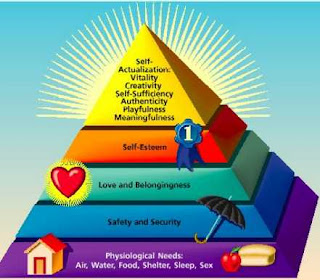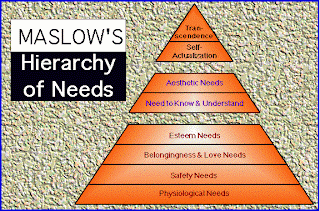 Growing up in the 50s meant that psychology either saw you as a Behaviourist rat (army training, school indoctrination, etc) or as some murky realm of unconscious horrors that would need endless therapy to disentangle (Freud started that).
Growing up in the 50s meant that psychology either saw you as a Behaviourist rat (army training, school indoctrination, etc) or as some murky realm of unconscious horrors that would need endless therapy to disentangle (Freud started that).A Third Force in psychology had started in the USA, studying healthy people rather than damaged ones, looking at our potential not our flaws, and when I bunked off school to read imported books in Foyle’s bookshop I came across Maslow, Jourard and others who sounded immensely attractive, modern and realistic to me. I even figured I would go on to university (as my mother hoped) to do Psychology and Philosophy, but at the interview for Bristol University it became clear that they didn’t have any sympathy with all that Californian nonsense about Zen and humanism…so we went our separate ways (I dropped out, along with many in my generation). My later attraction to Leary and Wilson comes from this interest in human potential rather than human damage and limitation...
This came up today because I realise that sometimes in these diaries I may occasionally make disclosures that could make others uncomfortable. I edit myself a lot, but if I edit people out of my everyday life I create an illusion and an untruth.
However uncomfortable, I still carry an idea I got from Sidney Jourard, in The Transparent Self, when he said that we tended to become our secrets. In short, all the grooming in the world, and smiling, won’t hide twisted insides from others (George Bush, anyone?) And equally, some people who appear to live in dire circumstances, and may even ruefully put themselves down, have an inner glow. He concluded that it seemed healthier to admit our faults and flaws to others, and hide our good deeds. And when he talked of ‘confessing’ he didn’t mean secret absolution like the Catholic confessional, but declaring your weaknesses before your fellows, as he claimed early Christians had done, and as Alcoholics Anonymous (and all the other such groups) do. Equally, he said, most of us try to cash in our good deeds for merit points (I gave a homeless man ten pounds today) rather than simply do them and ‘store up our treasure in heaven’.

I also liked the idea that before Huichole Indians take peyote they have to ‘clear the air’ by passing around a string and and tying a knot in it for each of their failings and sexual transgressions admitted before the tribe. They then burn the string. No-one wants weird vibes when taking psychedelics, and paranoia often comes from getting lied to…telepathy (if we can say such a thing exists) can only happen between people who do not hide behind their lies.
Of course, having said I prefer honesty and straightforwardness, I often fail – and have even found myself cheating or lying on tiny insignificant things for no apparent reason. (Freud may come in handy here, or the Behaviourists!) And equally, people can misuse this ‘honesty trip’ to merely act in a cruel way - “I am telling you this for your own good!” - but the general principle of not bullshitting people still seems good to me (especially around the young), and equally “doing good by stealth” still gives me a little glow (I could hug myself) that often sustains me better than telling people about it, in the hope they’ll think I am kind and generous – not easy to do without sounding like showing-off!
I quite like the models of Random Acts of Kindness – (Pass It Forward) – because such acts rarely come back to reach the ears of your friends and family, and you can savour the secret glow. You can even consider the possibility that such stuff may come back to you by another route (if you still believe in the ‘karma’ inherent in a ‘whole system’ worldview).
Information wants to be free. Stewart Brand
No comments:
Post a Comment